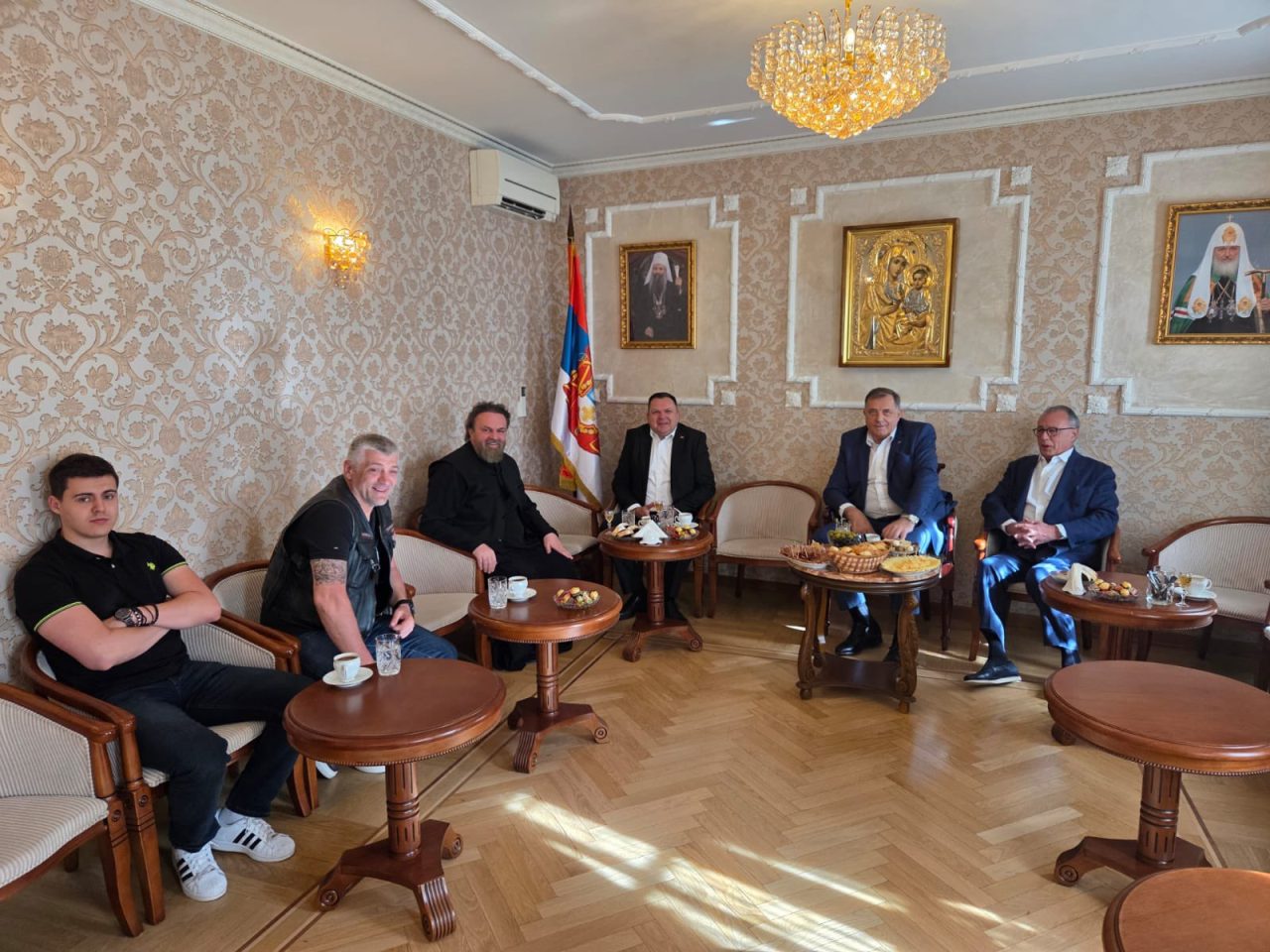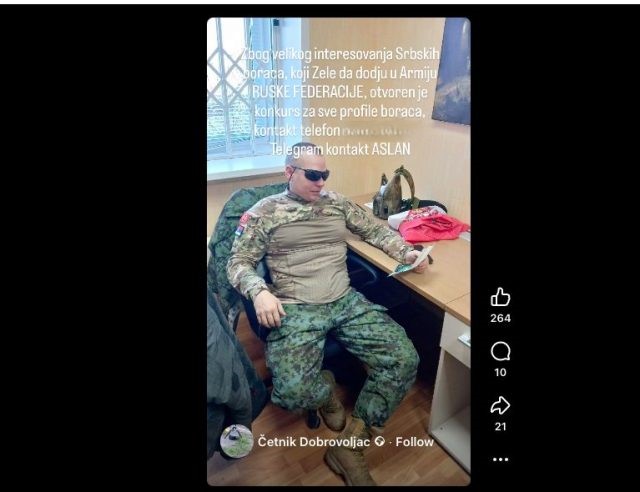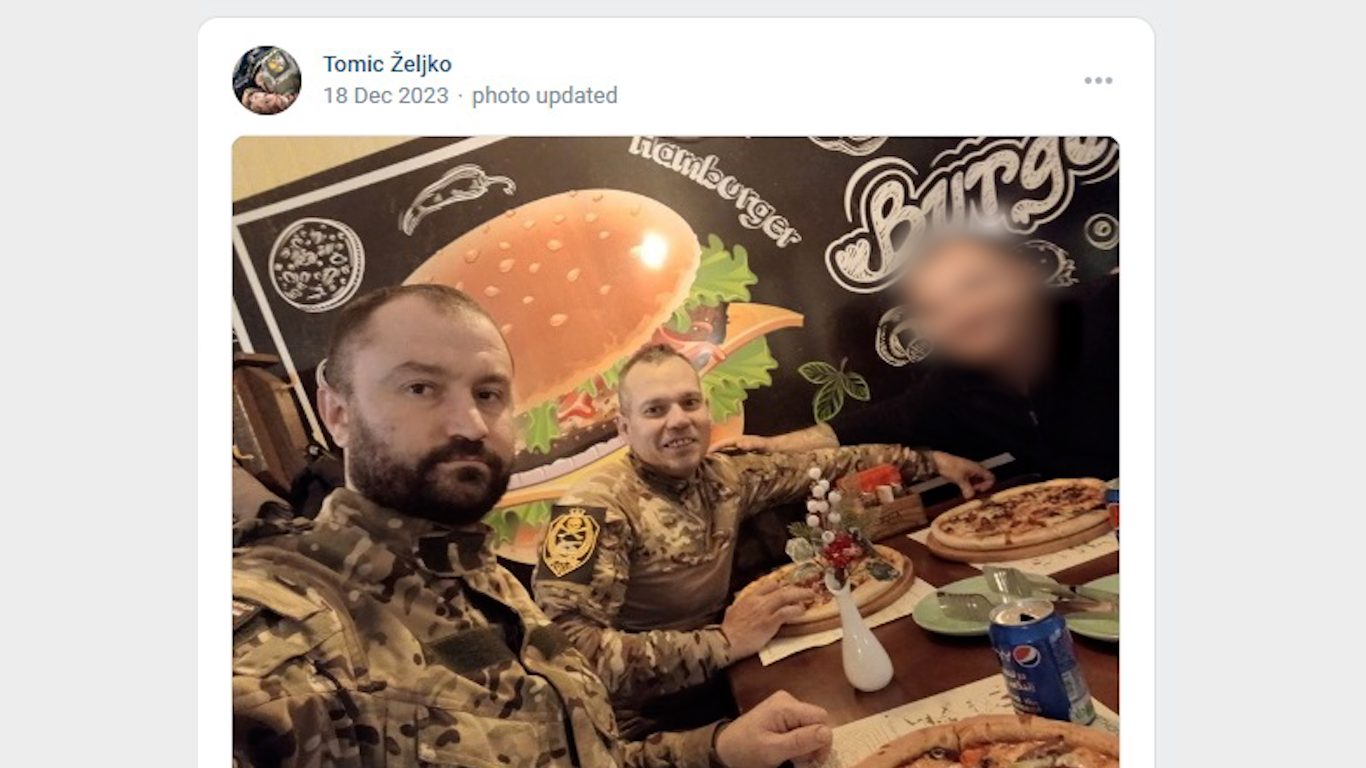This post is also available in: Bosnian
“Brothers, don’t forget, if there are any questions, you’re going to Russia as tourists. No other answers.”
This is one of hundreds of messages exchanged in a private Telegram group that BIRN journalists joined while investigating how mercenaries are using social media to recruit new troops from Bosnia and Serbia for the Russian army’s war in Ukraine.
Although both countries outlawed participation in foreign wars over a decade ago, BIRN’s investigation reveals that dozens of people from Bosnia and Serbia are still being recruited via Telegram to join Russian forces.
While spending four months in recruitment groups on Telegram, BIRN journalists found that veteran Balkan mercenaries are luring new recruits with promises of thousands of euros in payments, Russian citizenship and benefits for their families.
BIRN identified at least two well-known mercenaries as recruiters – Dejan Beric, known for his popular YouTube and Telegram channels where he shares his battlefield experiences with thousands of followers, and Davor Savicic, an experienced mercenary and Russian military intelligence officer who previously fought in Syria.
Both have been engaged with pro-Russian forces in the self-proclaimed Donetsk People’s Republic in the eastern Donbas region of Ukraine since 2014.
Beric told BIRN he would agree to be interviewed if well paid, while Savicic responded to BIRN’s questions by sending two voice messages containing insults and profanities.
Telegram did not respond to BIRN’s questions about the recruitment channels by the time of publication.
Frontline veterans
In July 2025, amid heavy losses on the Ukrainian battlefields and Moscow’s keenness to avoid an unpopular second wave of mass mobilisation, President Vladimir Putin signed a decree allowing foreigners to serve in the Russian army not only during a state of emergency, but also during ‘periods of mobilisation’, such as the one declared by the Russian leader in 2022, which is still in force.
Soon after Putin signed the decree, BIRN journalists saw several recruitment advertisements on social media, and contacted the recruiters using the name ‘Igor Dimitrijevic’ as an alias.
Following one such advert on Telegram, the ‘Igor Dimitrijevic’ alias got in touch with Dejan Beric, one of the best-known Serbian fighters in the Russian Army. Beric posts regular updates from the battlefield in Serbian on his Telegram and YouTube channels where he has thousands of followers.
But in July, the conversation on Telegram quickly fizzled out after Beric asked about Russian language proficiency, noting that only men aged 20 to 49 who spoke Russian were eligible to sign a contract.
However, on September 9, Beric sent a private message saying that a new unit was being formed, and it would consist of “many Serbs” and the Russian language would not be mandatory. “Serbs only”
In a voice message, Beric told BIRN’s alias to buy a plane ticket for a cheaper flight to Moscow via Istanbul, adding that the money would be refunded.
Beric also pointed out a rule: no “photos, videos or messages should be sent even to next of kin” from Russia or else several years of imprisonment would follow.
“Everything is strict. The training is not difficult, nothing complex. The commander is Vuk,” he wrote.
‘Vuk’ is a nickname used by Davor Savicic, a well-known mercenary from Bosnia’s Serb-dominated entity, Republika Srpska. Under this pseudonym, Savicic has appeared as a guest on Russian journalists’ television talk shows together with Beric.

Savicic (second from the left) meeting Dodik in Moscow. Photo: President of Republika Srpska
Discussing the details of the journey to Russia, Beric told BIRN’s alias that “Davor” would be waiting for him at Moscow’s Vnukovo airport.
Once journalists contacted “Davor”, he sent a photo of himself to help the new recruit find him at the airport. In the photo, BIRN recognised Davor Savicic. He refused to discuss contract details over Telegram.
“When you arrive, brother. I don’t want to discuss it over the phone,” he said.
Radio Free Europe has identified Savicic as an officer with the Russian military intelligence service, the GRU, reporting he has been recruiting mercenaries for Russia since late 2021 for his battalion, the Wolves.
It claimed that Savicic participated in the war in Syria as a member of the mercenary group Wagner, and then in 2018 and 2019 went to Donbas, serving as an instructor in a group of “GRU experts”.
Both Bosnia and Serbia amended their criminal codes in 2014 to ban fighting abroad, after the rise of Islamic State saw foreign nationals from all over the world, including Balkan countries, going to fight in the Middle East. In Bosnia, penalties range between two months and eight years in prison, while in Serbia the punishment is between two months and 10 years in prison.
However, recruits from both countries have been joining Russian forces since Moscow’s annexation of Crimea in 2014. Reports of Balkan mercenaries heading to Ukraine to fight for Moscow have been emerging since the start of Russia’s full-scale invasion of Ukraine in 2022.
In a written response to BIRN, Bosnia’s Prosecutor’s Office said they could not provide information on whether the state had launched legal proceedings against Savicic, as it cannot provide information on cases in the preliminary criminal proceedings stage.
In Serbia, the Higher Prosecution Office in Belgrade and Basic Prosecution Office in Ruma have both previously told the media they were investigating Beric, but did not respond to BIRN’s questions regarding the current status of this case by the time of publication.
Social media recruitment

Photo that Savicic sent to journalist. Photo: Detektor
Another advertisement for potential recruits into the Russian Army was posted on Facebook. Written in Serbian, the advert included a Russian phone number that “volunteers” could contact for more information.
Behind the number was a Russian speaker going under the name ‘Aslan’, who said he was serving in the army in Russia and was asked by a Serbian friend to help people from Serbia get a military service contract.
“We are all brothers,” he wrote in one of his private messages to BIRN’s alias Igor Dimitrijevic.
‘Aslan’ said that new conscripts receive the sum of 52,000 Bosnian marks (26,000 euros) immediately after signing a one-year contract, and later get a monthly salary of around 5,500 marks (2,250 euros).
BIRN’s alias was simultaneously added to a private Telegram group called ‘SVO’, which is an acronym for ‘special military operation’ – a term Russian officials use for the invasion of Ukraine.
The same day, 11 more people were added to the group. In the weeks that followed, more people were added and the group had over 20 members within weeks, with an age range from the mid-20s to mid-30s.
Introducing themselves, most of the group members said they were from central Serbia, and some said they were unemployed. Two of them said they were from Republika Srpska.
Another two said they had been in prison, and some admitted that they did not speak the Serbian language. One said he was a Macedonian.
By October 23, group members also included one woman who was interested in the possibility of joining the Russian Army, but after further checks, it was determined that foreign women would not be accepted. After that, the group administrator removed her from the group.
The administrator used the alias Cetnik Dobrovoljac (Chetnik Volunteer), a reference to the World War II-era Serbian nationalist force, the Chetnik movement.
“All of you will be even better than me. I know that, and I will pass on all my experience to you, the young. You are my Serbs and I won’t let you down,” he wrote in one of his messages to the group, stating he was brought back from the frontline to organise the volunteers’ journeys.
The original Telegram recruitment advert was re-published on a Facebook page with the same Telegram group admin’s name, Cetnik Dobrovoljac. The photos posted on the page as pictures of Cetnik Dobrovoljac were identified by BIRN as images of a man called Zeljko Tomic. Tomic was also pictured posing on a battlefield with Dario Ristic, a Bosnian recruit, in photos published on a since-deleted account on Russian social media platform VKontakte.
Ristic was arrested in Bosnia in September 2025 and charged with fighting abroad, in Ukraine. His lawyer Rade Culibrk told BIRN that they are currently trying to reach a plea bargain.
Promise of benefits

One of the calls for recruitment where journalists applied. Photo: Facebook
Cetnik Dobrovoljac told the SVO Telegram group that upon arrival at a hotel in the Russian city of Sochi, which was to serve as temporary accommodation, each of them would sign a one-year contract and receive a welcome bonus of 52,000 Bosnian marks (26,000 euros), followed by monthly salary of around 5,500 marks (2,250 euros) – the same amounts as ‘Aslan’ cited.
Cetnik Dobrovoljac also told the group they could later sign longer-term contracts and obtain Russian citizenship along with their families.
He said that their children would receive free education, and after the war, Russian authorities would help veterans adapt to normal life and provide them with jobs.
From Sochi, they were to travel to the frontline in Donetsk, Cetnik Dobrovoljac wrote.
If authorities raised questions during their trip to Russia, he told the group to say they were going to Russia as tourists, reminding them of Serbian President Aleksandar Vucic’s position that he will not permit Serbian citizens to join Russian units on the Ukrainian battlefield.
“[Vucic’s] job is to arrest us and prevent us from helping the RUSSIAN BROTHERS in the fight against fascism,” he added.
He advised the group not to take a lot of gear, as military equipment would be provided on-site, and said that it would be necessary to provide contact details for a family member in case of death.
Most potential volunteers initially had the same question: whether there would be any prior training.
“See guys, I can see that you are worried about the training. You will have training on a special training ground, with first-rate instructors. Don’t worry about that. Every [Serbian] dinar, or rouble, will be paid to you … You know me and you know I am a genuine fighter from the frontline,” Cetnik Dobrovoljac wrote in one of his messages.
He said training would take two weeks with experienced instructors. In one message he recommended that group members opt for sniper or drone operator training and avoid infantry units for safety reasons.
“You are coming to a healthy environment with full understanding from the regiment commander for the lowest-ranking officers; you will be trained by the best possible instructors with combat experience,” he wrote in another message.

Dario Ristić (left) with Zeljko Tomic. Photo: VKontakte
Before publication of this article, BIRN approached each group member with a request for comment. Group administrator Cetnik Dobrovoljac refused to answer the questions, calling the reporters “traitors”. In a voice message filled with insults, he said he would return to Serbia and “wipe all of you out”.
Aslan also did not respond to the questions, nor did most of the group members.
One, however, agreed to a phone interview, under condition of anonymity. He described Cetnik Dobrovoljac as a “fraud”.
“He’ll profit from you. For a month he’ll praise you, then he’ll send you to the frontline, and no one will ever find you again,” the Telegram group member, who said he had spoken to recruits in Russia, told BIRN.
He elaborated that he was disappointed with the two-week training period, considering it insufficient. He also criticised the administrator’s insistence that people leave as soon as possible for Russia.
“He behaves like he is inviting us to go out in town. Man, he’s asking if you’ve decided, as if that’s a decision to be made in a rush – to leave behind your parents and everything and just go there… He doesn’t give a damn about your life,” he said.
However, he seemed unconcerned about the possible consequences of going to fight, explaining that people he had spoken with who had returned from the war in Ukraine said that although they were questioned by Serbian authorities, they were later allowed to move freely.
While one member of the SVO Telegram group allegedly travelled to Russia, BIRN was not able to independently verify how many members of the group eventually took the trip.
Bosnia’s Prosecutor’s Office declined to speak to BIRN about possible prosecutions of the volunteers and only cited the criminal code’s provisions about penalties for going to fight abroad.
Investigative reporter John Lechner, the author of a book about the Wagner organisation, ‘Death is Our Business’, told BIRN that the new generation of recruits being enlisted to fight in Ukraine mainly has no previous combat experience, unlike those who joined Russian forces in 2014 after fighting in Bosnia and Kosovo during the 1990s wars.
“This first generation had direct ties to Russian volunteers who fought in Bosnia in the 1990s, and they leveraged these contacts to arrive in Crimea in 2014. There was a general belief that if these volunteers helped the Russians retake Crimea, then Russia will back them in retaking Kosovo. Through personal connections, additional Serbian vets were recruited who believed in the cause, or wanted a chance to return to war,” Lechner said.
“My understanding is that the current group of Serbs trying to go to Ukraine are … younger; they may not have had experience fighting in the 1990s,” he said.

Call for recruitment on Telegram. Photo: Detektor
‘Hello brother’ – then silence
BIRN contacted several other Telegram accounts that were posting recruitment calls.
A response came from an account under the name Sergei Kalashnikov, containing a recruitment poster and salary of 3 million Russian rubles (30,000 euros) for the first month. But then no further information was provided.
Another account, under the name Nikolai, appears to be run by a member of the Night Wolves, a motorcycle group close to Vladimir Putin. In a voice message in Russian, he said he would provide details, but never sent any more messages.
A Telegram account under the name Viktor, which also posted recruitment calls, responded in Russian: “Hello brother, we welcome you.” After a few days, he also stopped responding.
